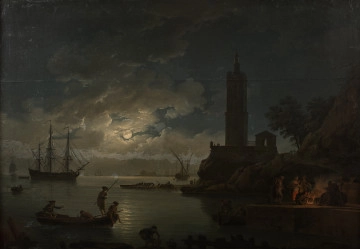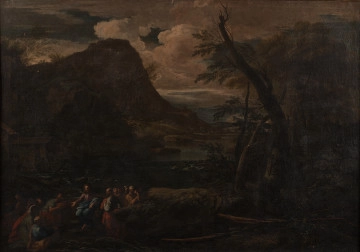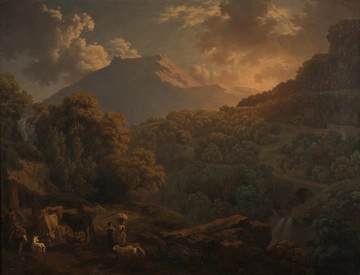
Port in the moonlight
18th century
Castle Museum in Łańcut
Part of the collection: European classics of modernity
Aleksander Kotsis is known as a precursor of realism in landscape and genre painting. He began his artistic education in 1850 at the local School of Fine Arts, studying with breaks until 1860). He attended the studios of Wojciech Kornele Stattler, Władysław Łuszczkiewicz and Aleksander Płonczyński. In the collection of the National Museum in Szczecin, there is a work from his early period, when he was finishing his studies in Kraków and received a foreign scholarship in Vienna. Its title is Pejzaż z bawiącymi się dziećmi [The Landscape with Children Playing]. It is one of the examples of works presenting his idealised image of the countryside. It still differs from his later work, in which he manages to achieve an individual character. The painting is characterised by a focus on building a mood in the Romantic spirit. It is created, among other things, by using juicy greens and muted browns. The placement of children against the background of a spreading broken willow tree acquires a symbolic character. The willow is sometimes interpreted as the Tree of Life and Death, reborn in almost all conditions. The performance can be read as an expression of hope - even though the willow is torn apart like Poland under the partitions, it can still be reborn, and this will be facilitated by the young generation.
Beata Małgorzata Wolska
Author / creator
Dimensions
cały obiekt: height: 37 cm, width: 50,5 cm
Object type
painting
Creation time / dating
Creation / finding place
Identification number
Location / status

Vernet, Claude Josef
18th century
Castle Museum in Łańcut

Dughet, Gaspar
17th century
Castle Museum in Łańcut

de la Rive, Pierre Louis
18th century
Castle Museum in Łańcut
DISCOVER this TOPIC
Museum of King Jan III's Palace at Wilanów
DISCOVER this PATH
Educational path
0/500

We use cookies to make it easier for you to use our website and for statistical purposes. You can manage cookies by changing the settings of your web browser. More information in the Privacy Policy.
We use cookies to make it easier for you to use our website and for statistical purposes. You can manage cookies by changing the settings of your web browser. More information in the Privacy Policy.
Manage cookies:
This type of cookies is necessary for the website to function. You can change your browser settings to block them, but then the website will not work properly.
WYMAGANE
They are used to measure user engagement and generate statistics about the website to better understand how it is used. If you block this type of cookies, we will not be able to collect information about the use of the website and we will not be able to monitor its performance.